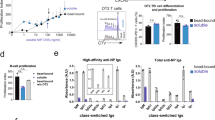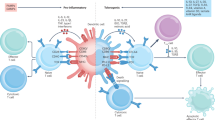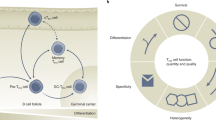Abstract
THE discovery that two cell types, thymus derived (T) and bursa or bone-marrow derived (B) cells, are involved in antibody production to some antigens was of particular importance to the study of immunological tolerance, as it became clear that inactivation of either cell line could result in unresponsiveness. Several workers have found that the two cell lines differ in the ease with which they may be made tolerant1–3. Their findings support the general proposition that T cells are made tolerant more easily than B cells, in that they require a lower antigen dose and are made tolerant more rapidly. Thus tolerance induced by low antigen doses would only involve T cells, whereas higher doses could make both cell lines tolerant. As T cells recognize the “carrier” aspect of an antigen and B cells recognize and make antibody to the “haptenic” determinants, this concept explains the carrier-specificity of tolerance4, and the breakage of natural and acquired tolerance by crossreacting antigens bearing “new” carrier determinants5,6.
This is a preview of subscription content, access via your institution
Access options
Subscribe to this journal
Receive 51 print issues and online access
$199.00 per year
only $3.90 per issue
Buy this article
- Purchase on Springer Link
- Instant access to full article PDF
Prices may be subject to local taxes which are calculated during checkout
Similar content being viewed by others
References
Taylor, R. B., Transplant. Rev., 1, 114 (1969).
Weigle, W. O., Chiller, J. M., and Habicht, G. S., Transplant. Rev., 8, 3 (1972).
Mitchison, N. A., in Cell Interactions and Receptor Antibodies in Immune Responses (edit. by Mäkelä, O., Cross, A., and Kosunen, T. U.), 149 (Academic Press, London and New York, 1971).
Weigle, W. O., J. Immun., 94, 177 (1965).
Weigle, W. O., J. exp. Med., 122, 1049 (1965).
Benjamin, D. C., and Weigle, W. O., J. exp. Med., 132, 66 (1970).
Iverson, G. M., and Dresser, D. W., Nature, 227, 274 (1970).
Taussig, M. J., Eur. J. Immun., 1, 367 (1971).
Eisen, H. N., in Methods in Medical Research, 10, 94 (Year Book Medical Publishers, Chicago, 1964).
Dresser, D. W., Immunology, 5, 378 (1962).
Carter, B. G., Yo, S. L., and Sehon, A. H., Canad. J. Biochem., 46, 261 (1968).
Haimovich, J., and Sela, M., Science, N. Y., 164, 1279 (1969).
Karush, F., in Specificity of Serological Reactions: Landsteiner Centennial, Ann. N. Y. Acad. Sci., 169, 56 (1970).
Katz, D. H., Hamaoka, T., and Benacerraf, B., J. expl. Med., 136, 1404 (1972).
Golan, D. T., and Borel, Y., J. expl. Med., 134, 1046 (1971).
Author information
Authors and Affiliations
Rights and permissions
About this article
Cite this article
TAUSSIG, M. Induction of Hapten-specific B Cell Tolerance by Low Doses of Hapten-Carrier Conjugate. Nature 245, 34–36 (1973). https://doi.org/10.1038/245034a0
Received:
Issue Date:
DOI: https://doi.org/10.1038/245034a0
This article is cited by
Comments
By submitting a comment you agree to abide by our Terms and Community Guidelines. If you find something abusive or that does not comply with our terms or guidelines please flag it as inappropriate.



